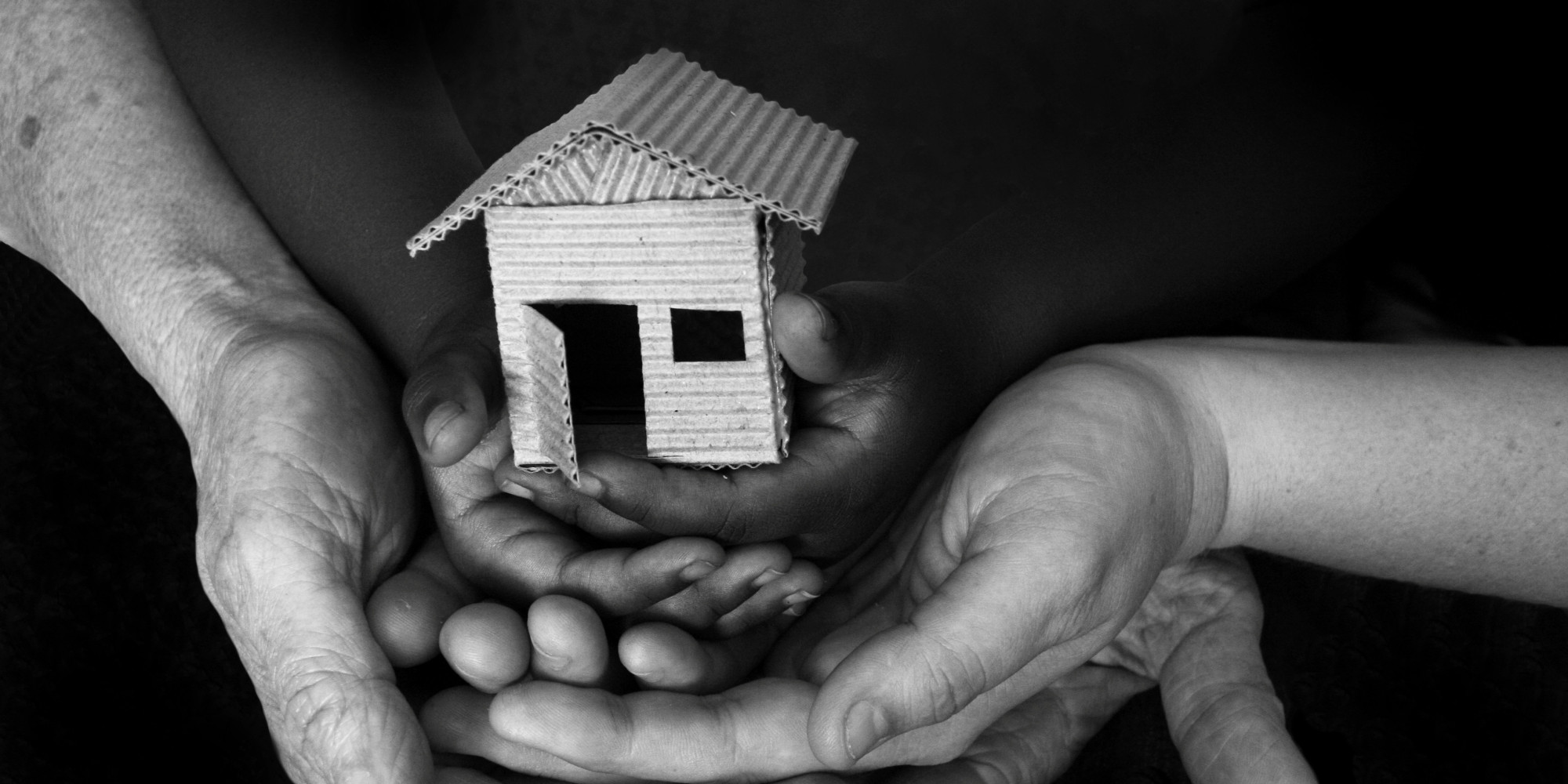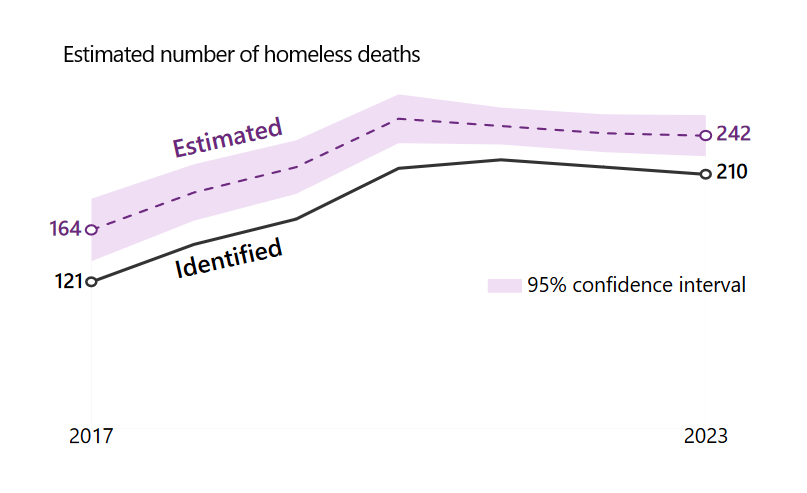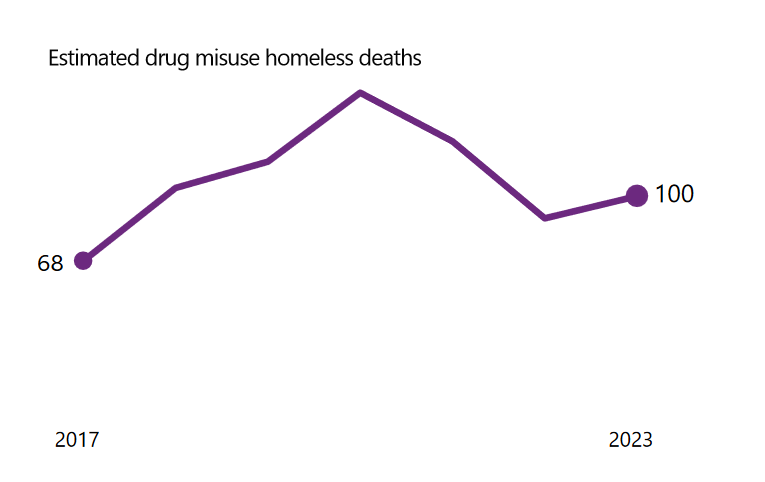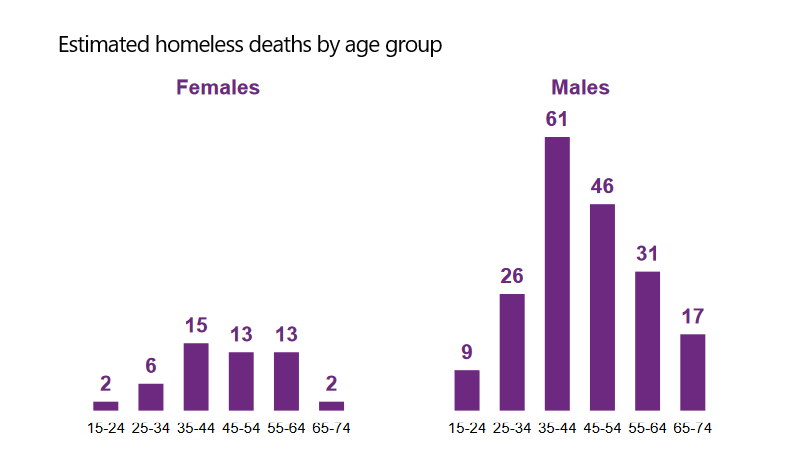Homeless deaths statistics spark renewed calls for data collection and service overhaul

More than 240 people died while homeless in Scotland for the second year in a row while the number who died from drug misuse deaths whilst experiencing homelessness increased by 36%, new figures have revealed.
Statistics released by National Records of Scotland (NRS) found an estimated 242 people died while homeless in Scotland in 2023, similar to the number of 244 in 2022.
The number who died from drug misuse deaths whilst experiencing homelessness increased from 89 to 100. Drug misuse accounted for 41% of all estimated deaths while homeless last year. Of those who died while homeless, 79% were male and 21% were female.
Beth Watson, senior assistant statistician, said: “Our estimate shows the number of deaths among people experiencing homelessness in 2023 is similar to the level in 2022. Homeless deaths are at a higher level now compared to the 164 deaths in 2017, when these statistics were first collected.
“Half of homeless deaths in 2023 were people aged under 45, with the most common age group for both female and male deaths being 35 to 44.”
Around 56% of homeless deaths were classed as “external causes” which includes most drug misuse deaths, accidents, suicide, and assault. In comparison, 6% of all deaths in 2023 were due to external causes.
Responding to the figures, The Salvation Army is renewing calls for all local councils in Scotland to record the cause of death for people housed in temporary accommodation and gather more accurate information on people sleeping rough.
The church and charity is warning that many of these deaths might have been prevented, but without accurate data it is very difficult to target effective support and prevention services for people experiencing homelessness.

By law in Scotland, local authorities must offer a minimum of advice, assistance and temporary accommodation to all homeless households and those at risk of homelessness depending on individual circumstances. However, there is no obligation to note on a death certificate whether the person was homeless when they died.
Helen Murdoch, assistant director of homelessness at The Salvation Army in Scotland, said: “The number of people dying in Scotland while homeless is grimly predictable and the increase in drug-related deaths is worrying. I am concerned that we simply do not have sufficient detail needed to identify trends or matters calling for a quick response. There is no specific question on a death certificate asking if a person was homeless and the figures released today include some skilful and carefully assembled guesswork.
“Councils are well placed to add depth and accuracy to these tragic statistics as all deaths must be registered with the local authority. That is why we are calling for all local authorities in Scotland to analyse the cause of death of people who die while in temporary accommodation arranged by the council or in a Housing First tenancy.”
The figures include the available data for people in temporary accommodation such as flats, houses, hotels and B&Bs in 2023. Not all local councils collate this information and statistics for people sleeping rough are based on very limited data available to provide an estimate.
Helen Murdoch added: “We would like to see a similar system to London’s CHAIN in place for areas in Scotland with high instances of rough sleeping. It provides real time information on people sleeping on the streets through a network of people and organisations participating, allowing charities and councils to act on the figures.
“For example, the quarterly CHAIN figures in June this year showed a sharp rise of 29% from April – June 2024 compared to the same period the previous year. In Scotland, there is no equivalent process for identifying a worrying spike such as this.”
Homelessness charity Cyrenians said services need a complete overhaul to prevent the avoidable deaths of homeless people.
Cyrenians pointed to figures which show over half of the people who died while homeless were due to “external causes” including assault, suicide and drug overdose - all of which the charity said could be prevented.

Amy Hutton, director of services at Cyrenians, said: “242 people died while homeless in Scotland last year – nearly half of which were due to ‘external causes’ including assault, suicide and drug overdoses. All things which we know can prevented.
“Every one of these deaths is a tragedy that is felt deeply by the people who loved them and the frontline staff working in homelessness services who are experiencing loss far too often. The homelessness system needs to get better at supporting people before they become so vulnerable their lives are at risk. Preventing homelessness saves lives.”
Matt Downie, chief executive of the charity Crisis, said the figures must be “a wake-up call for politicians of every party”.
Mr Downie said: “The sad truth is that in many cases these deaths will have been avoidable.
“Each year, more people are forced into homelessness, often trapped for long periods in emergency accommodation. We know how much damage that can do to your health.
“But it doesn’t need to be this way. We urgently need the Scottish Government and opposition to press on with plans to prevent homelessness in the first place.”
In response to statistics that show that an estimated 19 people aged over 65 died while homeless in Scotland in 2023, Debbie Horne, Independent Age’s Scotland policy and public affairs manager said: “It is a social injustice and a human tragedy that the estimated number of older people who died while homeless in 2023 has risen to 19.
“Every person’s death while homeless highlights that more must be done to make sure that no older person is faced with homelessness in the first place.
“All renters in Scotland, including those in later life, need to see the Housing (Scotland) Bill progress as soon as possible. The Bill provides much of what renters need to see, including homelessness prevention measures which will help address the housing crisis. Our research has shown that almost 1 in 6 older private renters are worried about being evicted in the next 12 months. Through the proposed duties in the Housing Bill, a greater focus on early intervention and resourcing homelessness can be tackled. The figures today show how vital this work is.”

Housing minister Paul Mclennan highlighted efforts by the Scottish Government to combat both homelessness and drug misuse.
Mr Mclennan said: “Every premature and preventable death is a tragedy and I send my deepest condolences to those affected by the loss of friends or family who were homeless.
“Scotland already has the strongest rights in the UK for people experiencing homelessness, but we are committed to ensuring that no one need become homeless in the first place.
“That is why we are investing in the £100 million multi-year ending homelessness together fund to prevent homelessness, end rough sleeping and reduce temporary accommodation use.
“We have also made record funding of more than £14 billion available to councils in 2024-25 to deliver a range services, including homelessness.”
He added: “Through our £250m national mission on drugs we’re taking a wide range of actions, including opening the UK’s first safer drug consumption facility pilot, working towards drug-checking facilities and widening access to lifesaving naloxone.
“We’ve maintained £112m to local alcohol and drug partnerships (ADP) for treatment and support services.
“We are investing nearly £600m this year in affordable homes, including an additional £40m to increase the availability of social and affordable homes through acquisitions, and bringing long-term voids back into use.”








